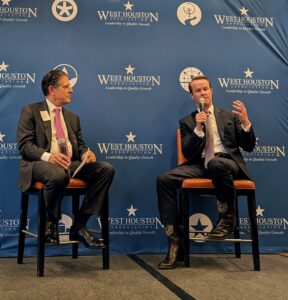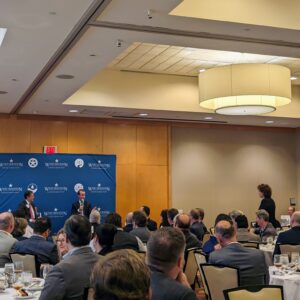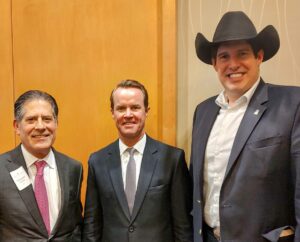 On November 16th, WHA members and guests gathered for a Legislative Update featuring the 76th Speaker of the Texas House of Representatives, Dade Phelan. The event took place in a Question-and-Answer format moderated by Chair of WHA’s Government Affairs Committee, Howard Cohen (Schwartz Page & Harding). Phelan and Cohen focused on issues related to quality growth and discussed some specific bills passed during the 88th Texas legislative session.
On November 16th, WHA members and guests gathered for a Legislative Update featuring the 76th Speaker of the Texas House of Representatives, Dade Phelan. The event took place in a Question-and-Answer format moderated by Chair of WHA’s Government Affairs Committee, Howard Cohen (Schwartz Page & Harding). Phelan and Cohen focused on issues related to quality growth and discussed some specific bills passed during the 88th Texas legislative session.
The event started with WHA President Alan Steinberg highlighting the importance of staying informed about current legislation and the role WHA plays in the legislative process. Steinberg reminded the audience, “We play a crucial role in shaping the policies that affect our region, advocating for high-caliber growth, improved infrastructure, and an enhanced quality of life for those who live and work in our community.” After being introduced by Cohen, Phelan was asked to talk about how he got involved with politics and some of his career accomplishments. Phelan discussed his time as a staffer, his motivation to make a difference, and that some of it just came down to being in the right place at the right time.

Cohen focused the discussion on infrastructure which soon turned to the topic of flood control projects and how they are being funded. Phelan noted that the Flood Infrastructure Fund (FIF) was initially seeded with about $800 million at its creation and acknowledged that more funding was needed. As a result of the 2023 legislative session, another $625 million was added to the fund this year. WHA, working as part of Houston Stronger, played a strong role in advocating for additional funding for the FIF this past session.
Pivoting to parks and green spaces, Phelan observed an increasing interest in them since the COVID Pandemic. He also noted the impact that improved park spaces have on the quality of life of Texas residents. In the 2021 session the legislature passed HB 1410 which provides for increased funding opportunities for parks and recreational spaces in Municipal Utility Districts. Phelan acknowledged the importance of the legislation and its role in quality development.

In discussing the power outage resulting from the Winter Storm Uri, Phelan discerned that, “one of the biggest failures of Uri was the lack of communication,” and that, “communication is key.” Phelan went on to discuss the push to strengthen the electric grid both with regard to dealing with natural disasters as well as to address the growth Texas is seeing. To show just how large the power demands are in Texas due to the growing economy, he talked about how there are crypto-currency companies in the application queue at the Public Utilities Commission that have an estimated demand for electricity which would exceed that of the entire state of New York. Discussion on power touched upon grid reliability, and he added that the legislature has recently passed Proposition 7, which offers incentives to certain energy providers to increase their power generation to help meet the growing demand.

On the topic of property appraisal reform, Phelan highlighted the ways in which a new bill, HB 14, might make it more efficient for property owners to receive an assessment for their property development plans. He explained that by allowing third parties to conduct an appraisal, the bill could save many homeowners both time and money.
The topic of flood planning came up again when WHA Water Resources Committee Chair Alia Vinson, (Allen Boone Humphries Robinson LLP), noted that $32 Billion was needed for flood related projects in Region 6 alone, and asked for insight on how to fund projects that do not have an attached revenue stream for repayment. Phelan responded by acknowledging that many flood control projects have already been researched and designed by experts, but the plans often sit idle without adequate financing. He added that he has seen a shift since Hurricane Harvey, which “opened people’s eyes.” He stated that any flood mitigation work has a big return on investment when considering the amount of damage that could potentially be avoided. He concluded that, “paying on the front end will lead to tons of savings on the back end.”
The West Houston Association looks forward to continuing our collaboration with public and elected officials to help ensure that the Greater West Houston region is an increasingly better place to work, live and play. Thank you to our sponsors for your support and thank you to everyone who joined us for this fantastic event!

